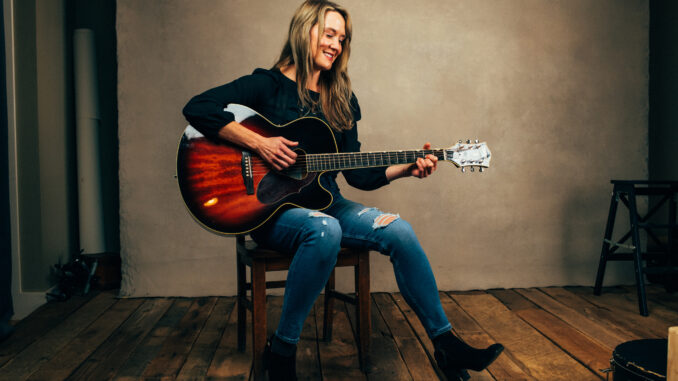
“All of a sudden, time stood still, and we watched our plans and expectations float away like lost balloons.”
For Angela Easterling, life began in South Carolina and, except for college years in Boston, has been music and family, festivals, songwriting, theater groups and folks in town ever since. Life goes on in the small rural town of Greer (though a Starbucks just opened up) with her partner and guitarist Brandon Turner and their three young boys.
She has recorded six albums starting with the aptly-titled “Earning Her Wings” in 2007, bringing a new attitude to her mixture of rough-hewn honky-tonk and winsome ballads. Her excellent “Black Top Road” followed in 2009. In one of the songs (‘Big Wide World’), she claimed that she wasn’t the marrying kind: I’ve never dreamed of being tamed and I wasn’t born to change my name. “Beguiler” came out in 2011 with songs inspired by Alice Sebold’s “The Lovely Bones.” Its songs range from from the upbeat ‘Happy Song’ to a slow and sad ‘Johnstown, Pennsylvania.’ In between she rocked out on ‘Two Clouds’ and went all-out country on ‘A Married Man.’ After disconnecting from the country-folk scene to make a French-language record (“Mon Secret”), she returned with the plainspoken “Common Law Wife” in 2015. “Musically, it’s inspired by Loretta Lynn,” Easterling asserted regarding the title track, “but I wanted to do a real and true country song from the perspective of a woman.”
Whether common law or officially hitched, wives have one important thing in common: Imagine my surprise when the stork paid a visit, and you can sense the surprise in her voice on the country tune. Her last release (“Witness”) came along in 2022 on the precipice of the pandemic and was recorded at several studios in her home state with Turner producing. The lockdown took a toll on her hometown, yet she and her family made the best of it. That’s what country folks do. Home is not a bad place to be when the world is in turmoil, as she sings on ‘Home’: It’s so simple, yet it’s so profound / But when life tosses me around / It’s the anchor of my heart / It’s where my memories start / Yeah, it made me who I am now.
Life is simultaneously many things at once: messy, beautiful, challenging, spontaneous, surprising. The sum of these, and more, shape who we are as people. Easterling sings about life from a place of genuine experience and authenticity that pulls you in tightly and is reluctant to let you go until the stories are told. In this AUK interview, the conversation goes to things that are important to her: family, the farm, theater, working out and, of course, her music. As in the deeply personal album, “Witness,” her forthrightness and sense of values comes shining through in songs like the wry ‘Middle-Age Dream’ where she sings about continuing to be a musician as life goes on. Many of us are very pleased she has made that choice.
Hi Angela. I just drove past Elkin (NC) on the way to Tennessee. You played a show there last year and it was streamed.
That’s the Martha Bassett show. Elkin has a great venue.
You can’t drive straight through on I-40 since the road washed our during the hurricane. Did your place in South Carolina get hit by Helene at all?
It did hit our area pretty bad. We live about an hour South of Asheville, so we didn’t get the disastrous flooding that they had, but there were trees down all over the place. Now, I know several people who lost their homes or had severe damage to their homes or their cars, and I mean, there’s still enormous trees down everywhere. Our kids didn’t have school for almost two weeks because there were so many power outages and the roads were too messed up so people couldn’t get around. Of course, it wasn’t anywhere near as bad as Western North Carolina. It was the craziest things I’ve ever seen. It looked like there had been a battle, like a tree battle, and we were in the house just listening to ’em fall. Fortunately, none fell on our house, We got really lucky.
I’m getting this bizarre image of animated trees doing battle.
That’s what it was like. It took us days and days to get the yard picked up, but the kids were home from school and they helped. It gave them something to do since our power was off.
So, you’re described as many different styles of musician from country to folk to pop. Perhaps we should just term you a contemporary musician?
Well, it’s hard because people want to know what to expect if they haven’t seen you before. I mean, I generally call what I do Americana or country folk. It has a little bit of all those things. I definitely have more of a country influence than some other folks do, but I wouldn’t really call it that. Personally, I think I fall more in between the country and folk music in an organic way.
What called you to become a professional musician?
I’ve always loved performing. From the time I was little, I’ve always loved music, dancing, being in plays.
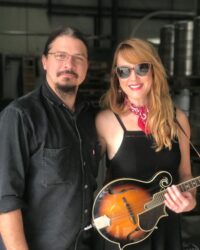
But someone told me you can be a little shy.
As far as social interaction. I am very, very shy. I have a hard time making friends and meeting people. That’s never been easy for me. But on the other hand, when I was four years old, instead of talking to the other kids, I would get out all the puppets and put on a puppet show. My way to interact with them was to put on a show. And I think I’m still that way. But as far as music, I was really into musical theater and loved to sing, doing plays. I went to a special high school for the arts and studied theater, and then went to Emerson College in Boston for musical theater.
While I was there, I really started getting into some female stinger-songwriters, Tori Amos, the Indigo Girls and Sarah McLachlan. And through them, I’ve discovered previous generation artists like Joni Mitchell and Emmylou Harris. So, I wanted to learn how to play guitar and write songs. I got my first guitar when I was a freshman in college, about 18 years old, and started trying to teach myself how to play. Within about a week, I had written my first song, which I’m sure was terrible.
What was your first guitar?
My first guitar was a hand-me-down classical acoustic guitar that my dad, who also worked at a college here in South Carolina, had bought from a student. I think he paid a hundred dollars for it. Learning how to play on a classical guitar was good because it wasn’t as hard on my fingers, not having callouses.
You went to the Kerrville festival the same as around 9 out of every 10 musicians.
Well, because you’re a songwriter, people say you should go to Kerrville. Steve Earle and Nanci Griffith started there, so I said, okay let’s do it. Kerrville is just a magical place. Everybody treats you like royalty when they find out you’re a songwriter. When you play a song, they don’t want you to play a cover, your version of some Neil Young song. They want you to play your own songs and hear what you have to say. They’re just so supportive. People come up to you all day and say I really like that line about blah, blah, blah, blah, blah. And they’ll quote it right back to you after only hearing it once.
During World Series time in baseball I was listening to your song ‘Throwing Strikes.’ Would you tell our readers a little about that one?
I’m a huge baseball fan and where we live near Greenville (South Carolina), our baseball history goes back to the textile mills that used to be in this area. All the textile mills had baseball teams. Our most famous baseball player from here is Shoeless Joe Jackson.
Not to be confused with the musician, Joe Jackson, who definitely wears shoes?
No. I didn’t really want to write a song about him because that’s already been done and people already kind of know his story, but I wanted to write a song about a baseball player. I just love the image of him going out to the old mill and throwing rocks to break all the windows in the mill because his life, his baseball career fell apart. And what he had to come home to had fallen apart as well. It was just a story I thought of one day, but yeah, I’m still a big baseball fan. I was rooting for the Dodgers over the Yankees to win the Series.
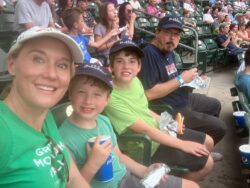
Not a Red Sox fan despite your time in Boston?
I went to college in Boston so my number one team is the Red Sox, but my number two team is the Dodgers. Since I root for the Red Sox, I don’t like the Yankees. And we have a Red Sox minor league farm team here in Greenville. Mookie Betts played here before he went to the Red Sox and eventually got traded to the Dodgers. He became a superstar after playing here.
I’ve seen you on stage and it seems easy for you to express yourself there, telling stories with ease. There was one I saw on YouTube from a library in Ann Arbor, Michigan.
That was only a couple of weeks ago. I didn’t know it was online, First of all, the storytelling definitely comes from theater. Theater was my introduction to the arts. Those house concerts that Brandon and I do are just a program that I developed for us to be able to go into libraries. More and more libraries are having concerts and they want to hear what we would play. Some of them like to have an educational component to it, so I came up with that many years ago when the Smithsonian had a touring exhibit and asked me to participate here in South Carolina.
That same program you watched in Ann Arbor, we performed that at a high school yesterday. I like to share a little bit about different songwriters that I admire and how I adapt that influence into my music, and then talk about the history of roots music. Brandon talks about blues. I love to tell stories, and in a way I have to because I’m not a household name. I mean, Bruce Springsteen doesn’t have to come out and tell the story of why he wrote ‘Thunder Road’ because everybody knows it. And Taylor Swift doesn’t have to tell about the guy that dumped her. Everybody already knows her life story but nobody knows mine or my music. I do like to tell the stories behind the songs because if they’ve never heard of me, they’ve never heard the song before, and that gives them something to connect to. But really, for me it goes back to theater, connecting with people through telling those stories.
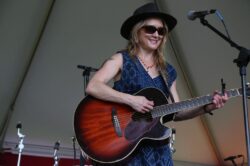
Do any of your songs come from other arts like theater or novels, something you see on television?
My song ‘Field of Sorrow’ I wrote after reading the novel, “The Lovely Bones” by Alice Sebold. The narrator of the book is a 14-year-old girl who’s been killed, and she tells her whole story from beyond the grave. I thought that would make a beautiful setting for a song. Then there’s another book called “The Book Woman of Troublesome Creek” by Kim Michele Richardson, which is about a woman who was one of the pack horse librarians in Kentucky over a hundred years ago. When I read that book, I was so shocked at what a woman had to put up with in that time period in Kentucky.
So, my song, ‘Keep Your Head Down, Johnny’ was inspired by that story. And there’s another song, ‘Isaac Woodard’s Eyes,’ which is about a real person, Sergeant Isaac Woodard, an African-American World War II veteran. I heard his story at a historical event that Brandon and I were playing, and I was just so struck by it that I came home to research it and wrote the song. Things like that just strike a chord in me, and then I write about ’em.
What was the backstory to the Woodard song? Was he murdered?
Not that. He was beaten and blinded. He was a World War II veteran and was in his dress army uniform. He had just received his final paycheck and been honorably discharged from service and was headed back home to his family on the bus. He had asked the bus driver to stop so he could get off and relieve himself. The bus driver basically told him to sit down and shut up. He turned to the bus driver and said, I’m a man, just the same as you. Don’t talk to me that way. So, the bus driver called ahead to the police and said that there was somebody causing trouble on the bus. The police came and pulled him off the bus and brutally beat him, drove their clubs into his eye sockets, threw him in jail, took his last paycheck from the Army, didn’t tell his family what happened. His family went to the bus station the next day to pick him up. He wasn’t there, obviously. He was in jail in Batesburg, South Carolina, and it took several days for them to even track down where he was. He had been beaten so badly he hardly knew what was going on.
That story in 1946 made national news, and Orson Welles did a whole radio broadcast about Isaac Woodard. It wasn’t a big story in the South for obvious reasons, but it was a big story throughout the rest of the country. Once President Truman found out about it, he was horrified, of course, and it was one of the things that led him to decide to eventually desegregate in the military.
So, you were self-taught on the guitar, but Brandon is a pretty mean guitarist. What came first with you two: in a relationship or in the band?
I saw him playing music and thought he was great. He sounds like three people in one, like you’ve got a bass player and a lead guitar player and someone singing harmonies. I just invited him to come play some shows with me. It took a couple of years before he was able to because he was a busy guy. He still plays with several other folks as well. We just realized we got along and got to be good friends, and next thing you know, these little baby boys started showing up.
Funny how those things happen when you least expect them.
Oh, I was expecting it, and then I was expecting, if you know what I mean.
So, three boys. What are their ages?
Four, eight and eleven. My oldest plays baseball, our middle son is a very talented visual artist, and our 4-year-old, if we wind up with one into music, it’s going to be him. He’s definitely got the performing bug. I mean, we can’t get him to even eat dinner because he’s always trying to put on a show for his brothers. All three are smart and funny and get on our nerves sometimes, but they’re great boys.
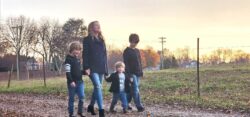
When you go on tour, you really hit all the spots. I’ve looked at some of the cities or towns and venues you go to, most of which I’ve never heard of and I live in the Southeast. You certainly have small town America figured out, at least in South and North Carolina.
It’s that way because we can’t travel far from home with kids this little. Fortunately, this is a good area to live because there’s lots of little places that you can play.
Your latest record is called “Witness.” Why is that?
The songs were sort of me looking at what had been going on in our country in the last few years and what I thought about all that. When you have kids, things that are political become personal. The whole school shooting thing, which I sing about in my song ‘Halfway Down,’ I’m taking my kids and dropping them off at school every day. And every time I hear one of these stories in the news, you just think, oh my gosh, that could be my child. When is this going to stop?
These mass school shootings seem so strange. In a way, you can comprehend a murder of passion or for crime, but what makes someone want to blow away a whole bunch of young people?
It’s not possible to understand, but the main problem I have that I try to get to in that song is that we’re kind of getting used to it. It happens, oh my goodness, and then just go on about our business. It seems to have become something people expect as a part of life, and nobody seems to think that there’s anything we can do to find an answer for it.
‘Grow Old’ appears to be about gratitude for the time we have to live. The introspective opening line is “All of a sudden it got quiet.”
I actually wrote that song right at the beginning of Covid. All of our shows went away overnight. I was supposed to be putting out an album that year. At the time, I was seven months pregnant with our youngest son when the lockdown started. We had to cancel the baby shower. Family couldn’t come over and see him. The first time he met his family, they looked at him through the window. But I used to take him on a stroller ride every day, and I was wondering about how much our life had changed and how different things were. We didn’t know if we were ever going to get back to playing live music.
I was thinking to myself, if this is it, what do I want from my life? And the thought occurred to me that I want to be able to see my children grow old, or at least middle-aged, Obviously I won’t be here to see them grow old, but I want to be able to be doubly-blessed with a long enough life for myself to be able to see them grow into adulthood and see what becomes of their story. It’s about how all of a sudden, time stood still, and we watched our plans and expectations float away like lost balloons.
Although that was a really dark time in many ways, there was a blessing that came from that. A lot of people don’t get to have that perspective without a tragedy, without someone coming down with cancer or a car accident. The world needs to have a time for reflection, and that’s what I wrote about.
You’re a musician who records and tours and writes, and a mother with three young boys. Where do you find time for just you?
Do I? Well, just for me, I go to the YMCA and work out. I’m dedicated to that, and I go usually at least five days a week. I’m always glad when it’s over, but I’m always glad I went. That’s the main thing I do for myself and my sanity, my health and wellbeing. Very, very, very devoted to exercise.
There is an intriguing song on Bandcamp called ‘Winter’s Lie’ that’s not on any of your albums. The picture is of you in a wedding dress.
That song was recorded during the sessions for “Common Law Wife” but just didn’t fit. It would have brought the whole album down. I loved the photo that Stacy Huckabee took with my head turned and a leaf floating down.
You live on an old farm. Was it active at one time?
It was and still is. My aunt and uncle run the farm. It goes back to 1791. Even during World War II, when my grandfather went off, his younger brother stayed and ran the farm. They used to grow cotton and peanuts and had chickens. But the whole time I’ve been alive, it’s just been cows. The house we live in is where my grandfather used to live.
On your website, you had something to say about the encroachment of suburbs, so I guess it’s being built up around your farm. Your song ‘Hammer’ was inspired by your grandfather, Harold Hammett, and Pete Seeger.
Yeah, we even have a Starbucks now. ‘Hammer’ is kind of the more spiritual side of “Black Top Road” in that I’m living on land that goes back over 250 years in my bloodline. I was thinking about all of the people that work so hard to have this legacy to pass down, and especially about my grandpa, because he was always working and fixing something, taking care of the cows, repairing the fence. We live in a house that mostly was built by him. He built all the barns back behind us. He was in his eighties, and he was still out working in the fields.
My boys won’t ever get to know him, but everywhere they look, they see the work of his hands, all these buildings around here that he built. And it’s funny, Brandon’s really handy and he can fix anything, so he’s always over here when something breaks, trying to figure out how to fix it, trying to figure out the fuse box and how my grandpa did this and how my grandpa did that. I love that. Like Brandon and my grandfather never knew each other, but they’re working together because he’s finishing my grandfather’s work. So that’s what that song ‘Hammer’ is about. When I was four, he built me a playhouse, and that playhouse is still standing out here. My kids play in it. And that’s the work of his hands. That was his hammer.
You made a French record. Where did that come from?
I love languages. In high school, I studied Spanish, and then when I got to college, I studied French. My school also had a campus in the Netherlands, and it was nice. We could take the train to France on the weekend and practice our French. I just think it’s such a beautiful language. I love the French culture, but I found learning French kind of difficult. I think that’s one of the reasons I liked it because I really had to focus. My grandfather, who farmed this land, was fluent in French. He was an interpreter interviewing German prisoners of war because back then more people spoke French than spoke English. Nowadays you go to Europe, pretty much everybody speaks English, but back then French was more of a universal language.
I met a woman from France here, Marianne Bessy, and she is a professor of French at Furman University, which is near here where we live. She and I got to be really good friends. When I was in the studio recording the song ‘One Microphone,’ I was thinking about how well that song would translate into French. So, Marianne and I just for fun wrote a French version of that song.
I would write some lyrics and send them to her, and she would make some changes. We went back and forth that way for a while until we finished. So, I’m going back to Nashville anyway, to finish up my mixes, and I told the engineer that I wanted to re-do that song. He said why, it’s already finished, and I said, well, I just want to sing the whole song over again in French. He said, what? I said, just let me try it. If it’s bad, we’ll throw it out.
It sounds as if he might have been a little skeptical.
Maybe so. I sang it a few times in French and he came back on the intercom and said, Angela, I think you sing better in French than you do in English. Then he came in and sang the harmonies that I wrote out phonetically for him. Marianne and I had so much fun that we wrote a whole album’s worth of songs. We took many of my other songs and even some new songs and did French versions of them. It was just something for fun, but it was also very challenging to my brain to try to be creative in another language and to try to fit a rhyme and a meter while being poetic. And of course, I wouldn’t have been able to do it without Marianne. I needed someone who was a native French speaker, and she helped me a lot with my pronunciation. That’s my little bonus album.
Your song ‘Baby Bird’ made me think of the time on my farm when a nest fell from the rafters and landed on a stack of square bales. The momma bird came back and continued to nest the eggs. We had to move it around and hide it in between bales so the cat couldn’t get it, and that pissed off momma. Somehow the baby bird fell out before it could fly. We picked it up and put it back in the nest, but after a human touches a bird the mother won’t go near it anymore.
Did the bird live? (It did.) Well, we were talking about Kerrville. I had gone through a difficult miscarriage a couple weeks before going to Kerrville. I have had a few, but this one was the furthest progressed pregnancy, and I was really having a hard time, in a dark place. My two boys got me through it. I thought about not going, but then I was like, no, I’m going to go ahead. I didn’t tell anybody what was going on. Even my family didn’t know. But that was the thing that really set me on the course of healing emotionally from that experience because when I got to Kerrville, I was there by myself. Brandon wasn’t with me, the kids weren’t with me, and I was playing my songs. As I was saying earlier, I was being embraced by all these people that appreciated me as a songwriter, and that was what I really needed in that moment. to not feel like I’m a mom, I’m a partner. If you think your only worth is as a mom, and you failed to keep this embryo or fetus alive, then you feel like a failure. But everywhere I went, I was just Angela the songwriter, and that healed me.
The most important job I’ll ever have is raising these children, but also before the children, and before I met Brandon, there was me, and in order to really heal from this experience, I needed to find my way back to myself. A couple of days before I had had that miscarriage, the little baby bird they had disappeared. And then a couple days later, my little bird went away. I went over to the theater and it was empty. I had my guitar and just sat down and wrote that song.
From what I understand, it took three years to write all the songs and put together “Witness.” There must have been a celebration when it was done.
Well, it took several years to get everything recorded because I started out with a completely different album, and we recorded a whole bunch of other songs. And then Covid happened and I wrote a whole bunch of different songs and we recorded them. Before I had kids, I went to Nashville and would spend a week recording, but I couldn’t really do that with two little kids. We were trying to go in the studio whenever we could and record a song at a time. Honestly, I don’t remember what I did to celebrate. I was just glad to have another album out.
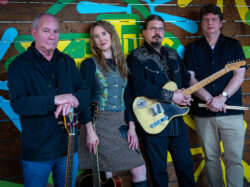
Did you have a proper album release show anywhere?
We traveled and did a lot of shows, and I guess you could say kind of a hometown release show in Spartanburg with the band, and that was really fun. It came out late in ‘22, so things were kind of slowly coming back. It was tough for some of the places we usually went. We didn’t make a huge big deal out of it. We might have in previous years.
In all these gigs and recording over the years, who has been the nicest and most supportive person you’ve met? Outside of Brandon, of course.
You’ll never meet anybody on this whole earth nicer than Jim Lauderdale and Buddy Miller. It’s not that I’ve been around them a whole lot; I’ve only met them both a few times. I’ve done a few shows with Jim, and we did Buddy and Jim’s radio show. Will Kimbrough is great to work with. I love Will. He’s talented and a cool guy. I’ve been fortunate to have him as producer on the “Black Top Road” album. We’ve met a lot of people, some you’d know and others who have just opened up their homes for us, invite all their friends over for a house concert and give us a place to stay the night. It makes you feel better about the state of the world and humanity to be around those folks.
You must have known Roger McGuinn. There’s a quote from him on your website.
I’ve only met him in person once, but he followed me on Twitter and started talking to me. At first, I thought, well, this is somebody from his label, or this is not really him. But he asked me to send him some music, and I did and he really liked it. I still can’t believe that he liked my music. That was really cool.
Where did you meet him?
I met him backstage at one of his shows, but this was many months after we had been emailing. He played one of my songs on the BBC when he was doing an interview and gave me such a nice quote for my website. I just happened to be in New York when he was playing, and so I got to go backstage and meet him in person very briefly.
What is your favorite record you’ve listened to this year that’s not yours?
I don’t listen to records a lot. Mostly I listen to SiriusXM, the Outlaw Country channel or the Bluegrass channel, but over the summer my kids and I listened all the way through the “Hadestown” Broadway show soundtrack while we were riding in the car and running errands. It took almost a whole week to get through the soundtrack. It’s so ambitious and so much more than you would have expected it to be. When people say it’s like a folk musical, it’s just so wonderful. And of course, there you have someone who was also a Kerrville new folk finalist, who’s now a Tony Award winning Broadway composer. It always goes back to Kerrville.
That would be Anaïs Mitchell. You haven’t seen the play though, have you?
Unfortunately, no. We do go locally as the area where we live has lots of theater. Oh, there’s one album I did listen to this summer, Will Kimbrough’s excellent “For the Life of Me.”

What’s one thing you’ve been asked that you haven’t talked much about before?
Yesterday, when we did the high school show, there was a young man with a notebook. I felt like I was being interviewed on TV. He had all these three and four-part questions. What he wanted to know was what do you think of the world as you look at it? And what would your advice be to a young person, and how do you incorporate that into your music?
What did you say to him?
Well, I wasn’t prepared for that, but I told him the first thing you need to do when you’re old enough is to go out and vote. That’s my advice. And how to look at the world, you start by learning the history of the place where you grew up and maybe still live there. For me, it goes back to my grandpa and that song ‘Hammer’. One other thing I’ll say about that song is that I started out with this idea of my grandfather, but while I was writing it, Pete Seeger died. And so, it’s also an allusion to Pete Seeger and ‘If I Had a Hammer.’ Where I say, I sing the elder’s stories to the young / So they may find the breath of life in of battles lost and won. That’s an homage to Pete Seeger right there, because I think he was a great American, and the music that he carried on and traditions that he passed down, we need to keep those going as well, just like we need to keep this farm going.
Yet if you listen to mainstream radio you might think life was one big party with trucks and tractors, boys and girls, stacks of cash and getting paid. Did that life ever sound appealing to you?
That just wouldn’t have been me. I’m an extrovert on stage, but in the rest of my life, I’m kind of an introvert. I’m just grateful for the life we have here on the farm. We have the opportunity to be working musicians and be home with our kids.


